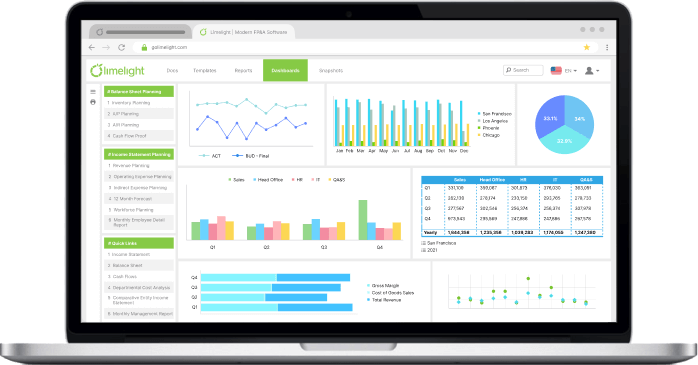Key Takeaways
- Financial reporting innovations enhance timeliness by using modern computers and software to generate reports instantly, replacing outdated quarterly practices from the 1930s.
- Interactivity in financial reports allows firms to roll up and drill down through data, revealing new insights through added layers and dimensions.
- Accessibility and customizability improve financial statements' utility by tailoring formats for different stakeholders, aligning departments with a consistent version of the truth.
- Data connectivity enhances financial reporting as financial statements interlink with other data, promoting comprehensive financial processes across departments.
- Limelight offers unique FP&A solutions by integrating modern innovations in financial reporting, providing a competitive edge over it's alternatives.
The accounting profession has existed for centuries and while the problems accountants deal with may have increased drastically in complexity their primary tools, financial statements, and reports, have remained mostly unchanged. This is because the accounting profession has developed an organized set of best practices to ensure the accuracy and value of their work. The world may have changed greatly since the birth of the Certified Public Accountant in 1896 but the core values of the accounting profession have not changed. Standardization in the field means that finance professionals from anywhere can interpret their colleagues’ work with ease.
There is always room for improvement, and the accounting profession is no different. Some critics have pointed out a distinct lack of innovation in the accounting field with regards to continuing outdated processes and not using technology to produce more value for the primary consumers of financial reports. Practices that have been around for almost a century can be updated to better reflect the needs and tools of the twenty-first century. Assumptions and practices were designed to be broken and replaced by improved versions. There are unexplored ways in which finance professionals can prepare financial statements and reports that add layers of depth and interactivity beyond what is already present on the page.
Here is a list of the Top 4 innovations in financial statements and reporting that can greatly improve the quality and frequency of an organization’s reporting process and lead to further benefits across the organization.
Timeliness
Modern computers and software enable reports to be generated instantly instead of once a quarter, a practice initially developed in the 1930s and better suited for that era of type-writers and physical financial records. Business changes constantly and the C-Suite needs to be on top of the latest business developments in case plans and strategies need to be re-drawn on the fly. The resilience of firms will be extremely important as unpredictable disruptions continue to disrupt entire economies. Modern technologies can enable better resilience by giving finance professionals instant updates on their financial position, but they first need to be implemented.
With modern technology, financial reports go from static snapshots to on-demand and accurate reflections of a company’s financial position.
Interactivity
Adding more dimensions and groupings gives firms the ability to roll up and drill down through data, increasing interactivity. These added “layers” can reveal new insights that were hidden due to the static, two-dimensional nature of most financial reports. Interactivity adds "layers” of detail and depth that are necessary to use financial statements like balance sheets for planning.
A bonus of adding interactivity to spreadsheets is that it can help with the customization and accessibility needed in reporting for an organization with diverse stakeholders.
Accessibility and Customizability
Using different formats for each stakeholder increases the utility of financial statements by making them more readable and consumable. Perhaps reports prepared for C-suite could be laid out from a high level while the reports meant for operational teams provide more detail. Adding a degree of scalability through automated documents and PowerPoint integration quickly aligns departments using one version of the truth for reporting.
Data Community
The primary financial statements are all intimately intertwined with the information that they present. Line-items present on the balance sheet, for instance, can be instrumental in producing the cash flow and income statements. Financial reporting does not exist in a vacuum and in fact, works better when data is interconnected in a single system which leads to further implementation of financial processes and planning in other departments.
Conclusion
While the accounting profession has produced a set of best practices that are widely applied and work well, there are still areas in which technology and modern ingenuity can improve the value of finance experts. Reforming the reporting process can in turn lead to the spread of planning and analysis from its home in the finance department across the firm.
For more information about reforming the reporting process, schedule a demo with Limelight today.





.png?width=381&height=235&name=linkedinreal%20(27).png)
